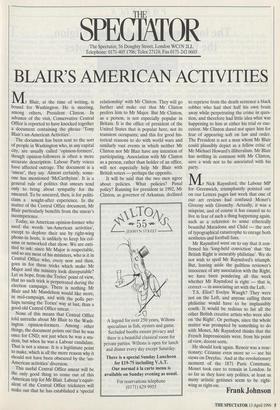SPECTATOR
The Spectator, 56 Doughty Street, London WC1N 2LL Telephone: 0171-405 1706; Telex 27124; Fax 0171-242 0603
BLAIR'S AMERICAN ACTIVITIES
Mr Blair, at the time of writing, is bound for Washington. He is meeting, among others, President Clinton. In advance of the visit, Conservative Central Office is reported to have knocked together a document containing the phrase 'Tony Blair's un-American Activities'.
The document has been sent to the sort of people in Washington who, in any capital city, are usually called 'opinion-formers', though opinion-followers is often a more accurate description. Labour Party voices have affected outrage. The document is a `smear', they say. Almost certainly, some- one has mentioned `McCarthyism'. It is a general rule of politics that smears tend only to bring about sympathy for the smeared. To be smeared, then, is for politi- cians a sought-after experience. In the matter of the Central Office document, Mr Blair particularly benefits from the smear's incompetence.
Today, an American opinion-former who used the words 'un-American activities', except to deplore their use by right-wing phone-in hosts, is unlikely to keep his col- umn or networked chat show. We are enti- tled to ask: since Mr Major is respectable, and so are most of his ministers, who is it in Central Office who, every now and then, goes in for these tricks which make Mr Major and the ministry look disreputable? Let us hope, from the Tories' point of view, that no such trick is perpetrated during the election campaign. There is nothing Mr Blair and Mr Mandelson would like more, in mid-campaign, and with the polls per- haps turning the Tories' way at last, than a good old Central Office smear.
None of this means that Central Office told untruths about Mr Blair to the Wash- ington opinion-formers. Among other things, the document points out that he was once for CND; not just when he was a stu- dent, but when he was a Labour candidate. That is not a smear. It is a legitimate point to make, which is all the more reason why it should not have been obscured by the 'un- American activities' diversion.
This useful Central Office smear will be the only good thing to come out of this American trip for Mr Blair. Labour's equiv- alent of the Central Office tricksters will make out that he has established a 'special relationship' with Mr Clinton. They will go further and make out that Mr Clinton prefers him to Mr Major. But Mr Clinton, as a person, is not especially popular in Britain. It is the office of president of the United States that is popular here, not its transient occupants; and this for good his- torical reasons to do with world wars and similarly vast events in which neither Mr Clinton nor Mr Blair have any intention of participating. Association with Mr Clinton as a person, rather than holder of an office, will not especially help Mr Blair with British voters — perhaps the opposite.
It will be said that the two men agree about policies. What policies? Penal policy? Running for president in 1992, Mr Clinton, as governor of Arkansas, declined to reprieve from the death sentence a black robber who had shot half his own brain away while perpetrating the crime in ques- tion, and therefore had little idea what was happening to him at either his trial or exe- cution. Mr Clinton dared not spare him for fear of appearing soft on law and order. The President is not a man whom Mr Blair could plausibly depict as a fellow critic of Mr Michael Howard's illiberalism. Mr Blair has nothing in common with Mr Clinton, save a wish not to be associated with his party.
Mr Nick Raynsford, the Labour MP for Greenwich, triumphantly pointed out on our Letters pages last week that one of our art reviews had confused Monet's Giverny with Givenchy. Actually, it was a misprint, and of course it has caused us to live in fear of such a thing happening again, such as a reference to some ethereally beautiful Maradona and Child — the sort of typographical catastrophe to enrage both aesthetes and football fans.
Mr Raynsford went on to say that it con- firmed his 'long-held conviction' that 'the British Right is incurably philistine'. We do not wish to spoil Mr Raynsford's triumph. But, leaving aside the guiltless reviewer's innocence of any association with the Right, we have been pondering all this week whether Mr Raynsford is right — that is, correct — in associating art with the Left.
T.S. Eliot? Evelyn Waugh? They were not on the Left, and anyone calling them philistine would have to be implausibly couth. It would be tedious to list all the other British creative artists who were also on 'the Right'. Or perhaps, since the whole matter was prompted by something to do with Monet, Mr Raynsford thinks that the French Impressionists were, from his point of view, decent sorts.
He should look again. Renoir was a reac- tionary; Cezanne even more so — see his views on Dreyfus. And at the revolutionary moment of the 1871 Paris Commune, Monet took care to remain in London. In so far as they have any politics, at least as many artistic geniuses seem to be right- wing as right-on.
Frank Johnson


































































 Previous page
Previous page